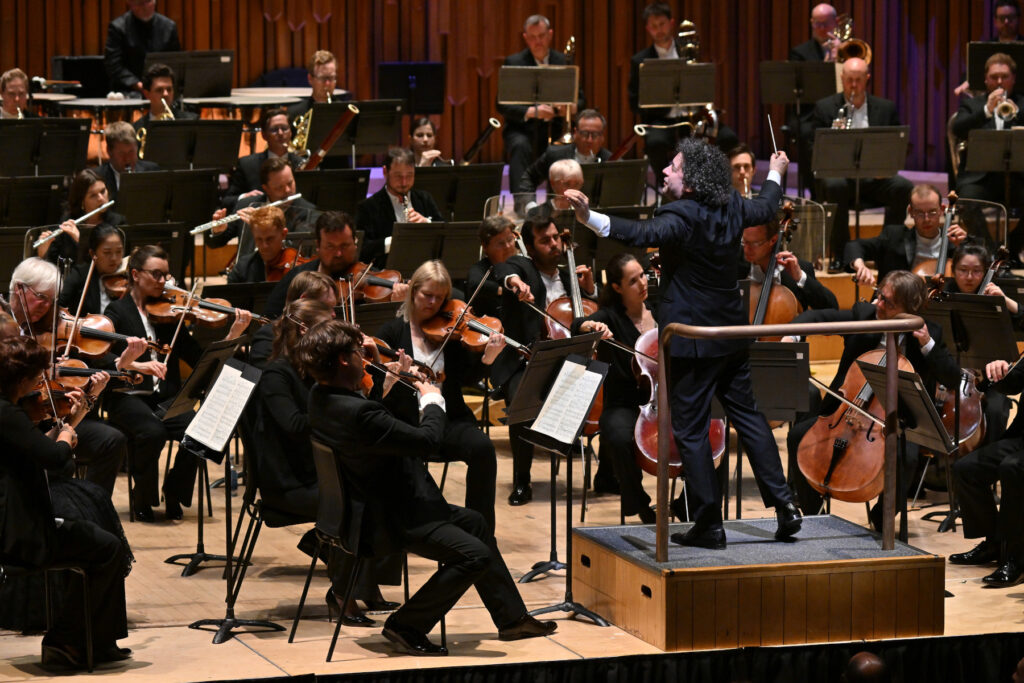We often get reminded that a review is just one person’s opinion. In this particular instance, I am going to be shamelessly subjective rather than assume some kind of position of dispassionate authority. The thing is that, from its opening moments, my responses to this concert were coloured (and possibly discoloured) by unease.
The compact programme, in which Gustavo Dudamel conducted the London Symphony Orchestra, was enticing: four works by two of the composers I most enjoy, Strauss and Ravel: Don Juan, Shéhérazade. with Marina Rebeka as soloist, Rapsodie espagnole, and a suite (the arrangement is attributed to Artur Rodziński) from Der Rosenkavalier. Maybe a ‘main course’ was missing, and it featured a soprano more reputed in bel canto than French song, but the concert promised sonic thrills, fascinating rhythms and captivating storytelling. This was my first experience of Dudamel – whom I expected to produce an impressive musical show – and, having attended the LSO’s season-opener of Nielsen, MacMillan and Sibelius and its concert performance of La rondine, both with Antonio Pappano in charge, I knew that the orchestra is on exceptional form. Salome in July, with Pappano conducting Asmik Grigorian in the title role, promises to be quite an event.
My press seat was on the left-hand side of the hall in row K, so relatively near the front of the auditorium. A little distance in any hall tends to lend enchantment, and it is no secret that the acoustic of the Barbican can hold challenges for both musicians and listeners. In Don Juan, the aggressive edge on the glockenspiel’s first notes made me flinch, and throughout the piece the more lavishly orchestrated passages (of which there are, of course, many) sounded congested, the inner parts densely tangled. Perhaps that was a quirk of the hall. More worrying in this mercurial tone poem were the surprisingly stiff transitions from one episode to the next, causing the overall momentum to stall. Where was the sweep that is so much a part of Strauss’s musical personality and – despite violin solos from Benjamin Marquise Gilmore that shimmered and swooned delectably – that magical ‘lift’ in the quieter passages?

Later, even the ‘Presentation of the Rose’ from Der Rosenkavalier – surely some of the most rapturous music ever written – failed to become airborne. There was a pewtery toughness in its silver gleam and, paradoxically, a strictness to the lavishly applied rubato – almost as if the phrases were being rewritten rather than flexed. (It was difficult to imagine what a soprano Sophie would have done in these circumstances.) Rodziński’s assemblage of excerpts from the opera takes a ‘wham-bam’ approach, hardly sensitive to context or continuity, but here the near-brutal thrust of the Prelude suggested little affection (and even a shortage of genuine sexual attraction) between the Marschallin and Octavian. The climax of the Trio was similarly pressured and some extra wit and insidious charm would have undercut the conscious vulgarity of Ochs’s waltz.
Talking of waltzes, I remember a mesmerising performance of La Valse at Barbican back in 2007, when Mariss Jansons (a master technician) conducted the Concertgebouw – the way the violins floated in with their melody near the beginning of the piece was spine-tingling. No matter how well you know a work by Ravel there should be moments in a performance when you are surprised by a harmony, a sonority, or a fleeting touch of volupté. Maybe Don Juan had stopped me in my tracks, because on this occasion, Shéhérazade failed to work its magic. Marina Rebeka made a conscientious rather than captivating guide to its imagined Asian lands, her words never quite fully emerging from her full, secure tone. In ‘Asie’ the orchestral climax (after “Je voudrais voir mourir d’amour ou bien de haine”) washed across the audience as it should, but the flute solos in the second song sounded too drawn-out and distant to be seductive. The narrator’s lover seemed to be playing from several streets away rather than outside her window. In a similar vein, no heat haze was generated by the looping string figure that opens ‘Rapsodie espagnole’ and, by the time it came to the final ‘Feria’, I felt sadly unable to join in the fun.
All this being subjectively said, I should add that the packed audience applauded enthusiastically and persistently, but I remain reluctant to concede that “Maybe it was just me …”
Yehuda Shapiro
Programme:
Richard Strauss: Don Juan, Der Rosenkavalier – Suite; Maurice Ravel: Shéhérazade, Rapsodie espagnole
Marina Rebeka (soprano); London Symphony Orchestra; Gustavo Dudamel
Barbican Hall, London, 14 May 2025
Photos: © Mark Allan